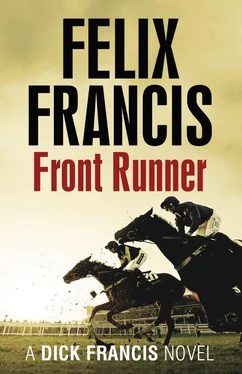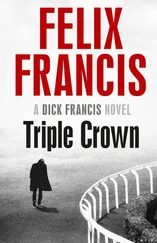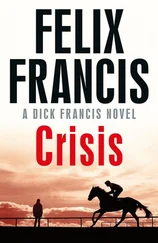I waited a second for Quentin to move but, when he didn’t, I went over and put my arm round Faye’s shoulders.
‘I’m sorry,’ she said, dabbing her eyes with a tissue. ‘Occasionally it all gets to be too much.’
‘You have nothing to be sorry about,’ I said. ‘It’s us who should be sorry for making light of something so serious.’
Faye took a deep breath. ‘I’m fine now,’ she said. ‘Now, what would you like for tea?’
The three of us ate hot buttered crumpets, washed down not with Earl Grey but with Sauvignon Blanc.
I felt the whole situation was unreal. Just six hours ago I had been fighting for my life and yet here I was genteelly eating crumpets in Richmond upon Thames.
‘Quentin,’ I said between mouthfuls, ‘what’s the maximum prison sentence for attempted murder?’
‘Life,’ he said confidently. ‘Attempted murder, by definition, indicates a conscious resolve to take someone’s life. In fact, tariffs can sometimes be longer for attempted murder than for murder itself. Some murder convictions occur when there was no desire to cause a death, for example when an accused only intends to injure, but the victim then dies. Intent to actually kill is crucial and is a requirement for an attempted murder conviction.’ Quentin never answered a question in five words if fifty could be used. ‘Why do you ask?’
‘No real reason,’ I said. ‘It’s just something to do with a case I’m investigating for the BHA.’
He lost interest. Racing was not high on Quentin’s agenda, as he regularly told me. He considered all sport to be the recreation of the proletariat and not worthy of someone of his standing.
‘And how was your game of golf this morning?’ I asked pointedly.
‘Humph!’ he snorted. ‘What a waste of time.’
‘Did you win?’ I asked, enjoying his discomfort.
‘No,’ he said. ‘The Lord Chief Justice won, but only because I let him. I had no idea he was so bad at golf. I thought I was the world’s worst player, but even I had to four-putt from eight feet on the last green to ensure he won by a stroke.’
I laughed.
‘It’s not that funny,’ he said. ‘I was trying to get myself noticed.’
I actually thought that Quentin Calderfield, QC, couldn’t fail to get himself noticed. He was one of the most successful and flamboyant Queen’s Counsels around. QC, QC was how he was known by everyone at the Bar, but he was also renowned for some of his conservative opinions.
But what he really meant by getting himself noticed was that he was trying to get himself promoted to be a judge and, in his assessment, the promotion was well overdue. It seemed never to occur to him that some of his more old-fashioned views on modern life, in particular to do with sexuality and race, may have been a factor in his current omission from the bench.
‘And were you noticed?’ I asked.
Quentin clearly didn’t like the tone of my voice, which, in truth, was slightly mocking. ‘We will have to wait and see,’ he said, tight-lipped. He then excused himself and went back to his study.
‘I wish you two got on better,’ Faye said after he’d gone.
‘We get on all right,’ I said, although it wasn’t true. ‘And I’ll definitely call him if I ever need a lawyer.’
‘Do you think that you will need a lawyer?’ she asked.
‘Probably, one day.’
She pulled a face at me. She didn’t like my line of work.
‘Do you want to stay for supper?’
I knew that she was only asking because she felt sorry for me. Lydia’s departure had been almost as big a disappointment for Faye as it had been for me. She desperately wanted me to be happy and saw it as her job to get me married off before she succumbed to the cancer. In her eyes, Lydia would have made the perfect sister-in-law.
‘Thanks, but no thanks. I’d better get back.’
I wondered why I’d said that. My flat would be cold and lonely. I’d become used to domestic life as a couple and I missed the homely comforts of having a mate, especially one who enjoyed cooking as much as Lydia had.
‘You’re welcome to stay,’ Faye said. ‘We’re only having pasta and pesto. I can easily make enough for three.’
‘OK,’ I said. ‘Pasta and pesto would be lovely.’
Dave Swinton’s apparent suicide was the only topic of conversation at the BHA offices on Monday morning and there was genuine sadness amongst the staff.
Dave had been popular with everyone in racing, not least because of his famed good looks together with the humility that had accompanied his stunning ability on a horse. The previous December there had been a huge surge of support from the racing community to vote for him in the Sports Personality of the Year contest and it had carried him to an easy victory. It was something that had given the whole of racing a boost.
There was not only sorrow for his loss but also bewilderment that he could kill himself, and especially in such a horrendous fashion.
‘But why would he do such a thing?’ said one of the young female receptionists, who was in tears. ‘He surely had everything to live for.’
I decided not to enlighten her about Dave’s attempt to kill me. Not so much out of any sense of not wishing to speak ill of the dead or to add to her pain, but more because I doubted that she would believe me. In fact, I reckoned that no one would believe me, so I kept quiet.
While the collective grief caused others to spill out into corridors and stairwells to share their anguish, I shut myself away in my office and spent the morning studying the videos of all the races Dave Swinton had ridden in, but not won, during the preceding week.
I thought back to what he had said to me in his Jaguar at Newbury races: I had twenty-eight rides and ten winners last week, so I lost eighteen races .
Finding the eighteen races was easy using the BHA database and I watched the RaceTech video recordings of each of them.
Dave had finished second in six, third in four, and had been unplaced in the other eight, falling in two of them, once at the last fence when clear in front.
I watched all the available footage including the side and head-on angles but there was nothing I could see that indicated that a horse had been prevented from winning on purpose. But that was not to say it hadn’t happened. Dave Swinton was a genius in the saddle and, I was sure that if he had wanted to lose a race deliberately, he could have done so in such a manner that no one would have easily been able to spot.
I studied the starting prices to see if there was a particularly unusual result but that line of inquiry wasn’t especially fruitful, not least because, such was his following amongst the punters, all Dave Swinton’s mounts tended to start at much shorter prices than their past form might warrant. Indeed, of the eighteen horses on which Dave had failed to win last week, fourteen had started as favourite or joint-favourite.
I delved further into the archives, looking at the recordings of other races to compare how his recent mounts had run previously.
After four hours glued to the screen, I came up with three possibles, although I had my doubts about each of them.
The first was at Haydock Park the previous Saturday. He’d ridden a horse called Garrick Party into third place in a three-mile chase. There was little or no doubt that, going to and after the last fence, Dave had tried his best to achieve the best possible result, but the damage had already been done by then.
Garrick Party was a well-known front runner who had won a couple of races before by setting off in front and trying to hold on to a lead all the way to the line. Timeform described him as being ‘one-paced with no finishing turn-of-foot’.
As far as I could tell from the database, Dave had ridden him in three of his previous runs, including one of the victories. On all those occasions he had set off in front and established a lead, in one case such a lead that, at the halfway point in the race, he had been a whole fence ahead of the other horses.
Читать дальше












